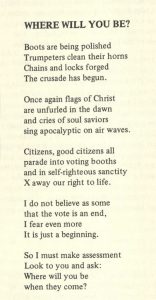In “Where Will You Be?” the speaker warns her audience that “the crusade has begun” and calls on them to resist this new war (4). “They will come,” the speaker explains, to “remove the evil, / the queerness, / the faggotry, / the perverseness / from their midst” (52, 26-30). Like “I am Brown” and “I Walk in the History of My People,” “Where Will You Be?” compares historical events to the present. However, “Where Will You Be?” replaces first-person statements with a direct call to action, as the speaker asks again and again, “Where will you be / when they come?” (19-20).

The opening stanzas of “Where Will You Be?”, as printed in conditions: five.
The speaker in “Where Will You Be?” uses images of religious persecution, linking queer people of the late twentieth century to the victims of the Crusades and World War II. This comparison begins the poem, as the speaker describes: “Once again flags of Christ / are unfurled in the dawn / and cries of soul saviors / sign apocalyptic on air waves” (5-8). However, the speaker argues that the perpetrators of this war will appear in a different way, and “They will not come / clothed in brown, / and swastikas, or / bearing chest heavy with / gleaming cross. The time and need / for ruses are over” (31-37). During both the Crusades and World War II, religious people were targeted and killed; in this next war, queer people become the next victims. In this poem, the speaker condemns religious people as “soul saviors” who wave “flags of Christ” and attack queer people (7, 5). Therefore, religious people become persecutors instead of the persecuted, and the speaker uses images of religious wars to reverse these roles.
Once again, a speaker reflects upon her own oppression and grounds these reflections in historical events. In “Where Will You Be?” the speaker asks her audience to change these reflections and their shared oppression into concrete action. Like other periodicals of the Feminist Poetry Movement, conditions: five—the 1979 Black women’s edition of conditions which includes “Where Will You Be?”—prompted dialogue among women of color and resistance to their oppressors. Poems like “Where Will You Be?” guided the tangible resistance of Second Wave Feminism—another type of war fought at the end of the twentieth century. In “I am Brown,” “I Walk in the History of My People,” and “Where Will You Be?” Third World women embrace their personal histories and embrace each other as they enter a feminist narrative usually dominated by the voices of white women.
Sources:
conditions: five, vol. 1, no. 5, 1979.
Parker, Pat. “Where Will You Be?”. conditions: five, vol. 1, no. 5, 1979.
